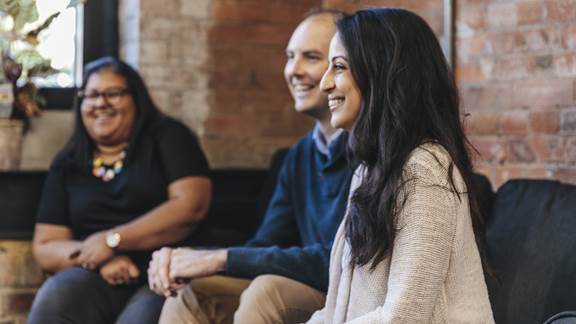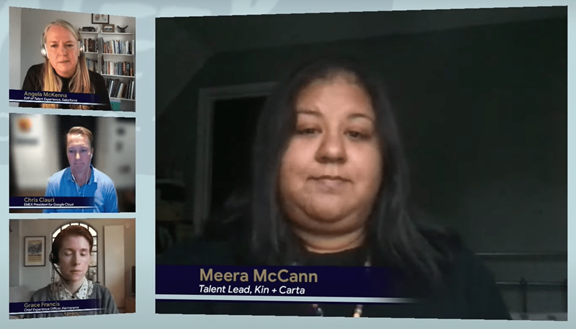As part of #IamRemarkable Week 2020, Kin + Carta joined a talk with Google Cloud on the theme of ‘actionable allies’ - it’s available to watch on demand here.
Meera McCann, our Head of Talent, connected with Chris Ciauri, President of EMEA at Google Cloud and executives from Salesforce and Accenture to discuss how to improve as a colleague, a mentor, a friend and a person.
As Chris states, “everyone on the panel goes above and beyond to be actionable allies.” Let’s dive into what Meera had to say:

Becoming actionable allies with Google
Why are you remarkable?
“I am remarkable because I have a two-year-old daughter who was actually born with a rare disability where one leg is shorter than the other, and she is at the age where she is becoming aware that she is different.
“We are working with her to show her that anything is possible and she’s starting to really own her disability. She’s super determined and I’m really proud of how we are overcoming obstacles as a family. It gives us a new perspective on the world and allows us to see things through a different lens, which I’ve never had to do before.”

What was your journey to being a good ally?
“My journey to being a good ally comes from talking to people - listening and understanding without judgement. It’s important to understand someone’s background and lived experiences and how they can influence and inform who they are today.
“When you meet someone in a professional environment, there can be so much they have been through prior to meeting you, so I think it’s important to take the time to find out how they would like you to support them - not necessarily how you think you should.”
People have a fear which makes them feel like they can't do something, but once they have faced the fears, I encourage them to jot down what they were worried about and how they faced it and then, next time they are in that situation, they can see how they overcame it.
Meera McCann
Can you share examples of times you’ve mentored people to discover the power of #IamRemarkable?
“With regards to finding an example of where I’ve needed an ally, I think it’s more important to have an ally that can go on the journey with you and not be confined to a specific event or time.
“I’ve worked with people to recognise their achievements and encourage an open feedback culture within the teams that I have been a part of. I think we can recognise that some people find it hard to talk about themselves and their achievements, so it’s important to show that they’re definitely not bragging if they are saying things based on facts. We need to push people outside their comfort zones.
“It’s helped push me by doing ‘I am Remarkable’ - it can be really powerful. People have fear and feel like they can't do something, but once they have faced the fears, encourage them to jot down what they worried about and how they faced it and then, next time they are in that situation, they can see how they overcame it.
“Being remarkable doesn’t mean you have to have run a marathon or physically climbed a mountain - it’s a really personal thing, so it’s important to recognise the small hurdles and barriers you've overcome as big achievements.”
How do you create a sense of belonging and allyship in your teams?
“It goes back to making sure everyone has a voice and providing the people that you are working with the platform to bring their authentic selves to work.
“By understanding individuals fully, you can be flexible and adapt your approach. So, we’ve got some safe spaces that we’ve created for people at Kin + Carta, like affinity groups for women, parents, LGBT people and those from multicultural backgrounds, which are safe spaces for people to share their experiences and lean on support when needed.
“[There are] small things you can do to create an inclusive environment and give people a sense of belonging, such as adding pronouns on Slack, providing sanitary products, inclusive photography etc. It’s about creating a space where people feel really welcome in your office and where they belong, regardless of who they are.
“This is never over and we want to always improve by asking people for feedback and what we can do better, and then acting on it. Whilst we are working remotely, it’s so much more important to check in with people and make sure we are listening and doing things as best we can.”
How do you overcome the fear of getting things wrong?
“It goes back to recognising where you have made the mistake before. When you are thinking back to that, more often than not, the repercussions are probably not as bad as you thought they would be, and if you are willing to be open about the fact you have made the mistake, people will be generally forgiving and work with you to improve.
“The thing that helps me with overcoming fear when I’m doing something outside of my comfort zone is make sure I’ve got a good support network around me. So, having one or two people who I really trust to run through my approach and thinking helps me face the fears, but they are also the people who will challenge me in the right ways and make me think really critically about what I’m saying and how I’m coming across.
“I think it’s OK to signpost fears as well. We are all human and everyone has them. You are OK to say you are not fully comfortable with something, or ask for feedback on how you handled something and where you can improve going forward.”
How do you make allyship systematic in your business?
“I would say the key way we have and are doing this in our business is having a continuous programme on education and awareness, including rolling out unconscious bias training so people are able to understand, recognise and challenge their biases. I really think that understanding your biases are the first hurdle you need to overcome to become a true ally.
“We have also created a reverse mentoring programme in which senior leadership teams are mentored by underrepresented groups to understand the challenges those individuals face in their lives and careers. I think that that education piece is hugely important.
“We have run white privilege workshops to enable people to really understand what white privilege is and how they can use their position to be an ally. We have run career stories to elevate people from underrepresented backgrounds in an informal company panel and Q+A. We are running a programme called pass the mic, too, where our social media channels are passed to underrepresented groups to enable them to share their stories - they are all about education and raising awareness.”
Do you have one piece of advice for driving more inclusivity?
“When you are hiring, don’t hire for culture fit, but culture add. The more people you are adding to your culture through diversity of thought and background, the more it will foster a really inclusive environment.
“Think how you can continuously improve those things - diversity, inclusion and allyship are never finished - it’s an ongoing part of any business and we really need to acknowledge where we’ve got problems. You need to be able to recognise to allow yourself to make some positive changes.”
Where do you go for inspiration and help?
“It’s the people around me who I work with or have worked with in past careers. It’s about seeking out people I know who are from a different background to me and just spending a bit of time with them without an agenda, and just listening and opening up with others. That’s definitely where I’ve got most of my knowledge from.”